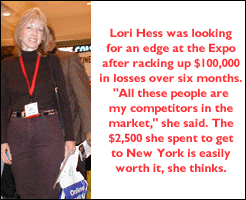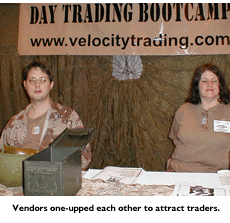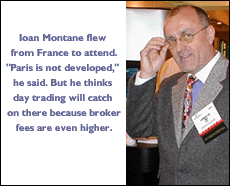|
Day-traders flock to expo
|
 |
February 22, 2000: 2:55 p.m. ET
New York show draws electronic traders hungry for tips and the latest technology
By Staff Writer Alex Frew McMillan
|
NEW YORK (CNNfn) - Lori Hess spent $2,500 coming to Manhattan for the International Online Trading Expo this past weekend. There was the $250 registration fee, the airfare from her home in Kansas City and the hotel room at the Marriott Marquis. But like 3,500 others, Hess figured the show, Feb. 18 through Feb. 20, was worth it.
The cost is minimal compared with her losses so far -- $100,000 since she started day trading. And she chalks it up as the price of plying her new trade.
"You're always trying to stay on top of the business," Hess, 42, said as she stood at the edge of the crowd thronging around training company Pristine.com's booth, listening to a motivational-speaker type chant out trading tips. "You want to meet your competitors. All these people are my competitors in the market. And you want to see what's out there."

The Expo had a carnival atmosphere as exhibitors tried to one-up each other in wooing the 3,500 total attendance. Velocity Trading Inc., for instance, had four people dressed in battle fatigues, giving out dog tags touting its Day Trading Bootcamps, training seminars for rookie traders.
On-Site Trading, a day-trading brokerage, created a mock-up of the set of the TV show, "Who Wants to be a Millionaire?" replete with a cheesy black-suited host. On-Site then gave away prizes to "contestants" who could answer a couple of basic questions about the stock market.
Traders escaping the corporate world
But the goofiness of this capitol of capitalism didn't faze the attendees. Day trading is serious business for Hess, who has an MBA and quit her job as a manager at greeting-card maker Hallmark last February to care for her sick mother. She started day trading at the brokerage The Trader's Club last summer, after her mother died.
Hess expected a six-month learning curve and to lose $60,000, but it lasted a little longer and cost more. Still, she insists she turned the corner in January and now makes money most days.
"I love it -- the best job I've ever had," Hess said. "I know I have a passion for this, I love to get up and do my job." She knew she didn't want to go back to the corporate world.

Hess has three strategies. She day trades 500- or 1,000-share lots of large-cap tech stocks such as Intel (INTC: Research, Estimates), Microsoft (MSFT: Research, Estimates), Cisco Systems (CSCO: Research, Estimates) and Applied Materials (AMAT: Research, Estimates), selling out quickly and certainly by the end of the day, looking for a move of an eighth or a quarter of a dollar.
Hess also is a "swing trader," a term that fluttered through the expo like a new high-school catchphrase. She buys 100- or 200-share blocks of highly priced, highly volatile Internet stocks, then holds them for a few days, hoping for a move of three or four points.
She also is a long-term investor. She used to trade actively through Merrill Lynch but she got fed up with the commissions, she said. Those sentiments reverberated around the two floors of exhibits at the Marriott.
Hundreds of day traders crowded the stands of the 119 exhibitors, greedy for a glimpse of the next big thing. The brokers, trading-training companies and software sellers were more than happy to satisfy their curiosity.

Day trading slowly going international
Direct-access brokers, which promise to route trades straight to the best price using intelligent-order-routing software, were the flavor du jour. They caught the eye of Ioan Montane, who checked in at the Tradescape.com booth and also complained of Merrill's high rates. "What can you do for me?" he asked. Commissions at $1.50 per 100 shares, he was told, if he put $10,000 into an account.
Montane had come from France, where he said day trading is just catching on. "Paris is not developed," he said, but he expects online brokers to be big news in France as it hits the mainstream. Brokerage fees are around four times as expensive as they are in the United States, he said.
A computer scientist by training, he bought Intel back in 1978, made a bundle and has never looked back. He now makes four or five trades a day. Even so, Montane said there are drawbacks to trading from outside the United States.
Montane likes to trade only Nasdaq stocks; he thinks the French market doesn't have enough liquidity. But it's tough to find news coverage of the stocks he likes to follow, he said. He watches American news networks, but he can get only the European version of financial news, which doesn't satisfy him.
Wall Street also is watching direct access brokers. This month, CyberCorp, announced a deal to sell out to Charles Schwab & Co. for $488 million in stock. Half a billion dollars gives direct access a lot of credibility. Large market makers like the Knight/Trimark Group and established ECNs like Reuters-owned Instinet, as well as Nasdaq itself, pitched up at the Expo.
Given the technology connecting day traders to the market, there's little difference between day traders and Wall Street traders anymore, said Louis Okser, a Knight/Trimark senior vice president of product development.
"We're day trading like everybody else," he said. Knight/Trimark hires around 100 traders a year, mainly guys who studied technical subjects like math at schools like MIT. "There's no difference except that we think we are better traders."

"Education, more education"
Is it a brave new trading world? As traders perused the endless booths and books on day trading, sat through 30 seminars like "Four Logical Steps to 80% Day Trading Success," hung on every conversation for some sure-fire trading secret, you couldn't help thinking many had thrown $250 into the wind.
But they were optimistic it was an investment in this peculiarly American and peculiarly turn-of-the-century pursuit. Ed Hexter, a day trader from Fort Lauderdale, Fla., knew why he was in New York on a snowy, dreary, late February day. "Education, more education," Hexter said.
Like Hess, he lost money day trading when he started two years ago. Like Hess, he thinks he has turned the corner, in his case after three months.
And like Hess, he was here in search of an edge, thumbing through a neon-pink-covered book called "The Strategic Electronic Day Trader." In this new world you're either fast or your dead. "You have to be quick, be very quick," he said as he rushed off. 
|
|
|
|
|
 |

|

